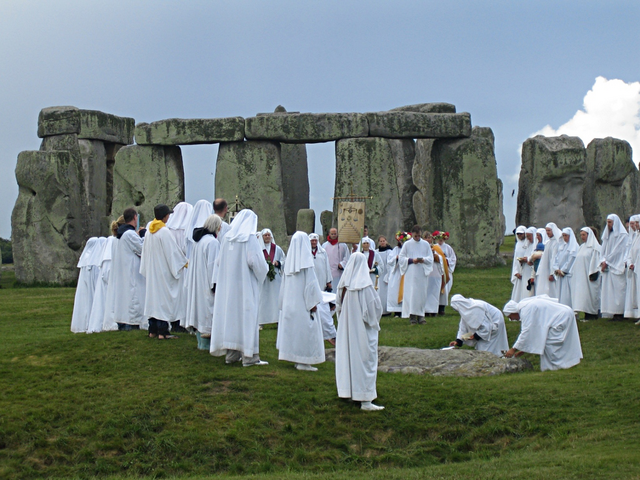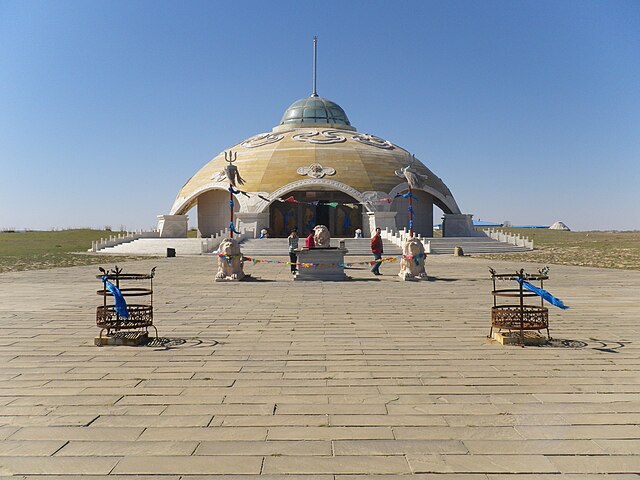List of modern pagan movements
From Wikipedia, the free encyclopedia
Modern paganism, also known as "contemporary" or "neopagan", encompasses a wide range of religious groups and individuals. These may include old occult groups, those that follow a New Age approach, those that try to reconstruct old ethnic religions, and followers of the pagan religion or Wicca.


Early movements
Pre-World War II neopagan or proto-neopagan groups, growing out of occultism and/or Romanticism (Mediterranean revival, Viking revival, Celtic revival, etc.).
- Druidry (modern)
- Ancient Order of Druids (1781)
- The Druid Order (1909)
- Thelema (1904)
- Germanic neopaganism/Ariosophy
- Germanische Glaubens-Gemeinschaft (1907)
- Guido von List Society (1908)
- Church of the Universal Bond (1912)
- Adonism (1925)
- Slavic Native Faith (1920s–30s)
- Zadruga (1937)
- Church of Aphrodite (1938)
Ethnic and cultural
Summarize
Perspective
Germanic

Heathenism (also Heathenry, or Greater Heathenry), is a blanket term for the whole Germanic neopagan movement. Various currents and denominations have arisen over the years within it. Some of these denominations follow white supremacy, and some of the groups listed here follow folkish ideology.
- Europe
- Scandinavia
- Íslenska Ásatrúarfélagið (1972)
- Samfundet Forn Sed Sverige (1994)
- Åsatrufellesskapet Bifrost (1996)
- Forn Sed Norge (1998)
- Samfälligheten för Nordisk Sed (1999)
- United Kingdom
- Odin Brotherhood
- Odinic Rite (1973)
- Odinist Fellowship (United Kingdom) (1988)
- Asatru UK (2013)
- German-speaking Europe
- Artgemeinschaft (1951)
- Heidnische Gemeinschaft (1985)
- Deutsche Heidnische Front (1998)
- Eldaring (2000)
- Latin-speaking Europe
- Scandinavia
- North America
- Heathenry in the United States
- Asatru Free Assembly (Stephen McNallen, 1974–1986)
- Ásatrú Alliance (1987)
- Ring of Troth (1987)
- Asatru Folk Assembly (1996)
- Odinist Fellowship (United States) (Else Christensen, 1971–2005)
- Odinic Rite (1973)
- Wotansvolk (1995)
- Heathenry in Canada
- Heathenry in the United States
Celtic

- Celtic Reconstructionist Paganism (1980s)
- Neo-druidism or neodruidry, or druidism or druidry
- Dynion Mwyn (1950s/60s)
- Reformed Druids of North America (1963)
- Order of Bards, Ovates and Druids (1964)
- Monastic Order of Avallon (1970)
- Ár nDraíocht Féin (1983)
Italic
- Italo-Roman neopaganism or Religio Romana
- Assocaizione Tradizionale Pietas[1]
- Nova Roma
- Roman Traditional Movement

Hellenic
Baltic

- Dievturība (Latvian)
- Lithuanian neopaganism (Romuva)
Slavic

- Rodnovery (Native Faith) (1920–30s)
- Zadruga (1937)
- Rodzima Wiara (1996)
- Native Ukrainian National Faith, RUNVira (1964)
- Peterburgian Vedism
- Slavic-Hill Rodnovery (1980s)
- Ynglism (1991)
- Native Polish Church (1995)
- Union of Slavic Native Belief Communities (1997)
- Rodnover Confederation (2015)
- Commonwealth of Pagan Communities of Siberia–Siberian Veche (2015)
- Zadruga (1937)
- Ivanovism (1930s)
- Tezaurus Spiritual Union (Authentism) (1984)
- Russian Public Movement "Course of Truth and Unity" (Concept of Public Security "Dead Water") (1985)
- Bazhovism (1992)
- Kandybaism or Russian Religion (1992)
- Ringing Cedars' Anastasianism (1997)
- Levashovism or Russian Public Movement of Renaissance–Golden Age (2007)
Uralic
Caucasian
Other European

- Albanian folk believers
- Hetanism
- Assianism (Ossetian Native Faith)
- Zalmoxianism
Turko-Mongolic

- Aar Aiyy Faith (Yakut: Аар Айыы итэҕэлэ) (1996)[3]
- Aiyy Faith (Yakut: Айыы итэҕэлэ), former Kut-Siur (1990)[3]
- Aiyy Tangara Faith (Yakut: Айыы Таҥара итэҕэлэ) (2019)[4]
- Burkhanism/Ak Jang (Altay: Ак јаҥ) (1904)
- International Fund of Tengri Research (Russian: Международный Фонд Исследования Тенгри) (2011)[3]
- Mongolian shamanism/Tengerism (Mongolian: Бөө мөргөл/Тэнгэризм)
- Tengir Ordo (Kyrgyz: Теңир Ордо) (2005)
- Vattisen Yaly (Chuvash: Ваттисен йӑли)
- Chuvash National Congress (Chuvash: Чӑваш наци конгресӗ) (1989–1992)
- Chuvash Traditional Faith Organization "Tura" (Russian: Организация традиционной веры чувашей "Тура") (1995)[3]
Canarian
Semitic
Kemetic
- Kemetism
- Kemetic Orthodoxy
- Kemetic reform
- Kemetic Orthodoxy
American
- Ausar Auset Society (1973)
- Mexicayotl
- Native American Church (late 19th century)
Sub-Saharan African
- Godianism (1948)
Korean
Wicca
Summarize
Perspective
Wicca originated in 1940s Britain (UK) and became the mainstream of neopaganism in the United States in the 1970s. There are two core traditions of Wicca which originated in Britain, Gardnerian and Alexandrian, which are sometimes referred to as British Traditional Wicca. From these two arose several other variant traditions. Wicca has also inspired a great number of other traditions in Britain, Europe and the United States, most of which base their beliefs and practices on Wicca. Many movements are influenced by the Movement of the Goddess, and New Age and feminist worldviews.

- British Traditional Wicca
- Gardnerian Wicca (1954)
- Alexandrian Wicca (1967)
- Central Valley Wicca (1969)
- Algard Wicca (1972)
- Chthonioi Alexandrian Wicca (1974)
- Blue Star Wicca (1975)
- Eclectic Wicca and Inclusive Wicca
- Celtic Wicca
- Covenant of the Goddess
- Saxon Wicca
- Dianic Wicca
- Faery Wicca
- Georgian Wicca
- Odyssean Wicca
- Wiccan church
- New Reformed Orthodox Order of the Golden Dawn (1968)
- Church and School of Wicca (1968)
- Circle Sanctuary (1974)
- Covenant of the Goddess (1975)
- Aquarian Tabernacle Church (1979)
- Rowan Tree Church (1979)
- Coven of the Far Flung Net (1998)
- Other Wiccan-related traditions
- Stregheria (Italian tradition)
- Hedge Witchcraft
- Cochrane's Craft
- Children of Artemis
- Feri Tradition
- Reclaiming
Eclectic or syncretic
See also
References
External links
Wikiwand - on
Seamless Wikipedia browsing. On steroids.
